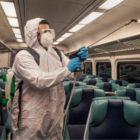Cameron on Transportation
The Engineering Marvel Beneath Your Car: Cameron on Transportation
|
The 47,000 miles of highways that comprise America’s interstate highway system are nothing short of an engineering marvel, perhaps surpassed only in mileage and design by what China has built in the last few years. We take them for granted, but when they were designed almost 60 years ago these superhighways presented both great opportunity and vast challenges. Mind you, the U.S. wasn’t the first with superhighways. Those bragging rights go to the Germans, whose Reichsautobahn saw cars zooming along at 100+ mph in the 1930s. Most credit President Dwight Eisenhower, whose troops rode the Autobahn in World War II, for seeing the military value of an American equivalent, though engineering such a complex across the U.S. was far more difficult.
Of course by 1940 the US already had the Pennsylvania Turnpike and by 1954 the New York State Thruway, but those private toll roads were just the beginning.



